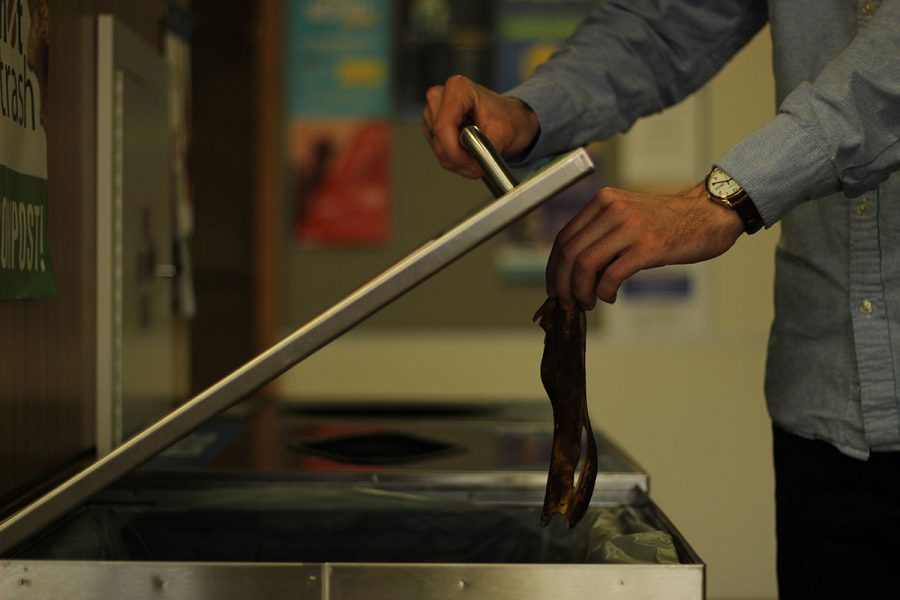Student Office of Sustainability works to educate students on composting
UW-Eau Claire’s compost system depends on students’ cooperation
More stories from Alyssa Anderson
Photo by Gabbie Henn
Organic materials and food scraps belong in the compost bins, but water bottles, forks and other non-biodegradable items don’t. The Student Office of Sustainability wants students to take the time to sort their trash.
According to the Environmental Protection Agency, composting has undeniable benefits for individuals, communities and the environment.
Not only does composting reduce waste production, but the EPA website explained that the food scraps usually tossed in the trash can be composted to create enriched soil, which can yield higher numbers of agricultural crops, reduce or eliminate the use of chemical fertilizers and can aid in reforestation by decreasing contaminated soils.
If composting has so many benefits, why isn’t everyone doing it? The answer is simple: People simply don’t know how, Austin Northagen, director of the Student Office of Sustainability, said.
At UW-Eau Claire, the Student Office of Sustainability has made efforts to encourage correct use of the university’s composting system; however, many students continue to use it incorrectly.
Walking through Davies on the way to class, it’s easy to ignore the signs above the garbage cans and just throw all trash into the bin marked “trash.” However, taking just a moment to separate waste can make a significant impact on the environment.
Northagen, a fourth-year English critical studies student, oversees the SOS and has been working to educate students on proper composting practices in order to keep the compost system up and running.
“The composting program was initiated by the Student Office of Sustainability and can be removed by us at any time,” Northagen said. “Just like any program on campus, if people don’t use it or use it right, we can cut it.”
Northagen explained that the SOS is allotted a budget of $184,000 to help improve the university’s relationship with the environment. The green garbage bags used for compost cost an extra dollar than regular garbage bags — so if students throw plastic water bottles into the compost bins and contaminate the compost, the extra money essentially goes to waste.
“Every student pays $10 a semester that goes towards our budget, so we have to make sure that we’re spending the students’ money wisely,” Northagen said. “If students can’t use the composting program correctly, it’s a waste of student money.”
Since many students aren’t using the composting program correctly, Northagen said the SOS has had to discuss taking away the compost completely. To prevent this, they are trying new tactics to educate students on what, and what not, to throw in the compost bins.
This semester, the SOS has been passing out composting and recycling “cheat sheets,” explaining what to throw in the trash, what to recycle and what to compost. Northagen said he plans to go around to different campus organizations, classrooms and to visit with faculty to present on the correct ways to manage waste.
“The best benefit (of composting) for the university is that it provides a direct experience for students to engage in environmental efforts,” Northagen said. “In general, it redirects waste from landfills and into the compost.”
The compost is taken to the same landfill as regular trash, but goes to a different area, Northagen said. In a few weeks, the compost turns into soil that can be repurposed and used to plant trees, food and other crops.
“It’s awesome because it encourages a system of repurposing and reusing, and not putting it in a landfill,” Northagen said. “A portion of what goes into the landfill is compostable… It’s food. If we can redirect that food to be repurposed and reused as soil, then we reduce our landfill and the amount of trash.”
Though taking the time to sort through your trash on the way to class may be a burden, the extra minute it takes to toss your food scraps into the correct bin is a means of helping protect the environment.
“I’d love to see our campus become more environmentally aware and conscious,” Northagen said. “But that first step is making sure the students are also aware.”
By focusing on education, awareness and outreach, Northagen said he hopes to keep the composting system up and running for years to come. It only takes a minute to sort your trash, but that minute makes a difference.
Anderson can be reached at [email protected].

